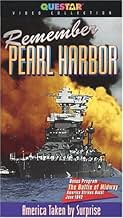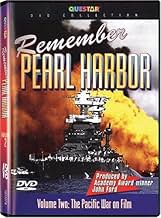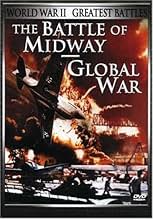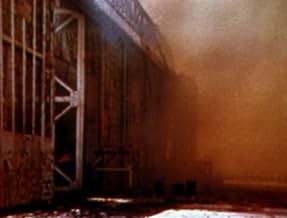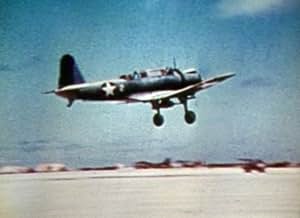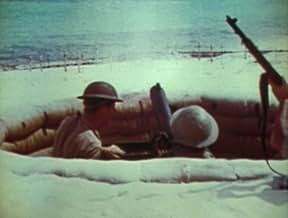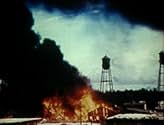NOTE IMDb
6,1/10
2,4 k
MA NOTE
Ajouter une intrigue dans votre langueThe Japanese attack on Midway in June 1942, filmed as it happened.The Japanese attack on Midway in June 1942, filmed as it happened.The Japanese attack on Midway in June 1942, filmed as it happened.
- Réalisation
- Scénario
- Casting principal
- Récompensé par 1 Oscar
- 1 victoire au total
Henry Fonda
- Narrator
- (voix)
Jane Darwell
- Narrator
- (voix)
James Roosevelt
- Self - US Army Major
- (as Major Roosevelt)
Donald Crisp
- Main Narrator
- (voix)
- (non crédité)
Irving Pichel
- Narrator
- (voix)
- (non crédité)
Jimmie Thach
- Self - Naval Aviator
- (non crédité)
Avis à la une
This Oscar-winning documentary – by one of the most revered American film-makers who would have celebrated his birthday on the day I watched this – is quite celebrated, having even been treated to a 2-page spread in the early 1980s British periodical "The Movies". However, the passage of time has not been at all kind to it: not only, at just 18 minutes, does it not dwell in sufficient detail on the famous conflict that purportedly changed the course of the Pacific War
but the whole is lent the director's typically homespun – read sappy – approach, which really dates it! The film obviously retains historical value for its rare colour footage of the battle (some of which was actually incorporated in the star-studded 1976 Hollywood rendition of these same events, MIDWAY!) and, for the record, Ford regulars Henry Fonda and Jane Darwell supply the intermittent narration.
This is a great, short (less than 20 minutes)film of one part of the key battle of the war in the Pacific. Keep it mind, the Battle of Midway was fought in early June, 1942. The darkest days of the Pacific War for America. Pearl Harbor, the Phillipines, Bataan, Corregidor, Wake Island; all American defeats. It is, indeed, a "propaganda" film. Or, at least it was turned into one after John Ford shot it. But the film of the combat itself is no propaganda piece. It took a lot of courage for Ford to stick his cameras out and film while hundreds of Japanese planes struck the island. Many Marines died in the bombing. Ford could easily have been killed. Of necessity, Ford could only film the land portion of the battle, which was an attempt by Japanese naval forces to reduce the island's defenses and then conduct a landing, possibly eventually putting Hawaii in jeopardy with a new, forward Japanese base on Midway. The major part of the battle was a naval battle between carrier forces. An "incredible victory" in the title of the Walter Lord book. Four Japanese aircraft carriers, miles from the filming on Midway itself, were sunk. It was the begging of the end of Japan. The stiff resistance put up by the Marines on Midway, captured by Ford, forced decisions by the Japanese High Command that ultimately led to the sinking of their carriers. Historically interesting film.
A documentary short, directed by John Ford. Covers the Battle of Midway, one of the most decisive battles of WW2. Taking place near the island of Midway in the central Pacific in June 1942, the battle turned the tide of the Pacific Theatre. Ford uses actual footage from the battle and the aftermath, with narration by Henry Fonda.
During WW2 the US used its mighty film industry to its advantage, producing high-quality news reels. documentaries and propaganda films. For this they enlisted some of the foremost directors of the age: Frank Capra, William Wyler, John Huston, John Sturges and John Ford, among others. Here, John Ford (or should I say, Lt. Commander John Ford, USNR) does his bit.
He does fairly well, capturing some great footage of the battle. It is more the editing and over-the-top, hammy added-on dialogue that weaken the film, and only when viewed with a 21st century lens. Propaganda films never have the same impact when viewed outside of wartime.
The movie went on to win the Best Documentary Oscar in 1943.
During WW2 the US used its mighty film industry to its advantage, producing high-quality news reels. documentaries and propaganda films. For this they enlisted some of the foremost directors of the age: Frank Capra, William Wyler, John Huston, John Sturges and John Ford, among others. Here, John Ford (or should I say, Lt. Commander John Ford, USNR) does his bit.
He does fairly well, capturing some great footage of the battle. It is more the editing and over-the-top, hammy added-on dialogue that weaken the film, and only when viewed with a 21st century lens. Propaganda films never have the same impact when viewed outside of wartime.
The movie went on to win the Best Documentary Oscar in 1943.
There have been many battles in the Second World War that played a part in deciding who the victors of the conflict were going to be, and one of these engagements is known as the Battle of Midway. Like any good ww2 film, this short combines good narration with impressive archive footage that was taken while the battle was ongoing. If that weren't enough, John Ford, one of the greatest geniuses in cinema history, directed this. The film starts with the narrator, Donald Crisp, telling the audience where Midway Island is located and why it holds such significance to the United States military. The film then goes on to show footage of the event that has often been cited as one of the most successful military engagements ever. At Midway, Japanese forces took 20 times the amount of casualties the Americans did, and american carrier aircraft managed to sink all 4 of the aircraft carriers responsible for attacking Pearl Harbor half a year earlier. This all took place only in June 1942, but even just 6 months into America's involvement in the war, they dealt a blow to japan from which they never really recovered. The footage of this event that Ford captured is remarkable because he was so close to the action. Many marines and other servicemen were killed on the island as japanese planes attacked from every conceivable angle, but Ford kept filming. You can see proof of this at one part where the camera gets knocked over by some kind of explosion. Aside from the exciting footage of combat and naval warfare, there isn't too much else to this short. It deserves praise because John Ford risked dying in action in order to record most of it, but at the same time, it's been eclipsed by a lot of other world war 2 related films that also showcase footage of this battle. What makes this one stand out after so many decades is the fact that its director was actually there in the midst of it, something that no modern documentary can boast. Because of this (and the huge interest I have in ww2 things) I have to consider Battle of Midway as one of the most iconic and well made second world war films. It goes without saying that this won an Oscar as well.
This short piece of film shows parts of, as the title already tells us, of the battle of Midway, and some moments after it. The director is John Ford and what he creates with this short documentary is pure Hollywood war propaganda. There is a storyline that even includes the women at home waiting for the fighters. During some scenes a dialogue between Jane Darwell and the great Henry Fonda is heard on the background.
The images of the battle, shot in color, have historic value and are pretty exciting. The heroic tone is easy to understand, although now it is easy to see past that. Everything, including its Oscar win, seems to be there for propaganda purposes, making the people at home feel good enough about the war that is going on. In the end 'The Battle of Midway' is an interesting little film, but not that much more.
The images of the battle, shot in color, have historic value and are pretty exciting. The heroic tone is easy to understand, although now it is easy to see past that. Everything, including its Oscar win, seems to be there for propaganda purposes, making the people at home feel good enough about the war that is going on. In the end 'The Battle of Midway' is an interesting little film, but not that much more.
Le saviez-vous
- AnecdotesDirector John Ford and cinematographer Joseph H. August were wounded by enemy fire while filming the battle.
- Citations
Main Narrator: Midway Island. Not much land right enough, but it's our outpost. Your front yard.
- ConnexionsEdited into Ils ont filmé la guerre en couleur (2000)
- Bandes originalesAmerica, My Country Tis of Thee
(1832) (uncredited)
Music by Lowell Mason, based on the Music by Henry Carey from "God Save the King" (1744)
Words by Samuel F. Smith
Played in the score and later sung by an offscreen chorus
Meilleurs choix
Connectez-vous pour évaluer et suivre la liste de favoris afin de recevoir des recommandations personnalisées
Détails
- Durée
- 18min
- Mixage
- Rapport de forme
- 1.37 : 1
Contribuer à cette page
Suggérer une modification ou ajouter du contenu manquant


